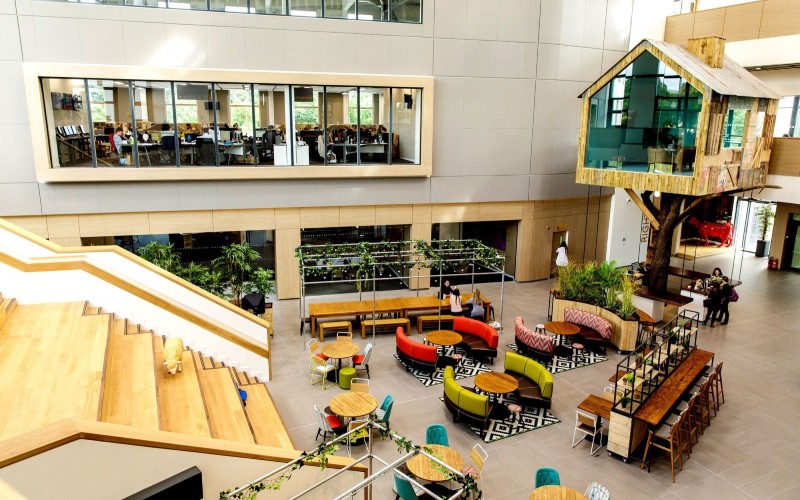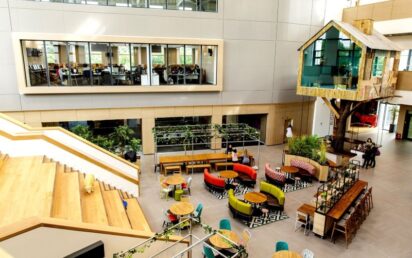COVID-19 ripped up the rulebook when it comes to the role of today’s workplace.
Companies have been quick to adopt hybrid working but the pandemic has raised the bar when it comes to what staff expect from their offices.
Wrexham-headquartered Moneypenny has gone as far as to involve staff in the design process.
“The culture at Moneypenny is very much ‘speak to the people’,” Hannah Williams Skinner, working life manager at the company, tells BusinessCloud. “Our head office came out of everyone’s suggestions: it is big and quite glassy.
“We have about 900 people in the Wrexham office (pictured). Every desk has a view of a beautiful part of the world: that was one of the things that people wanted. We have breakout space and gyms, while there are some more private and cool areas that people can use.
“We have a big focus on wellbeing. We’ve tried to make our offices somewhere that are safe and inclusive for everyone but also give them flexibility in terms of the shifts that they work and the opportunities that are available on site.”
Moneypenny, accredited as a Great Place to Work, has invested in bright orange bikes and electric vehicle chargers for staff.
They are also given an allowance to customise their desk. “We spend so much time at work we want to give them a place where they can feel part of something. The personal touch is really important,” explains Skinner.
Get the tech right
BankiFi provides software to banks to better serve the SME market. Chief financial officer Chris Fry worked as a partner at KPMG for 20 years before joining the Manchester-headquartered FinTech, which also has teams in Australia and the US.
Its Manchester base is now in Beehive Mill, Jersey Street. Fry says technology is crucial in enabling effective working across geographies. “When we moved into Beehive Mill it was quite different [to what we were used to],” he says. “It’s a nice cool space. Work has got to be a place that draws you in.
“We’ve got a team of about 50 people, with three-quarters of them being developers. A lot of them were based in Eastern Europe, some in India and others in the US and UK. We had to decide how many people would come into the office.
“What we needed was the ability to collaborate, not just through meeting [in-person] but to have all the technology in place to hold regular video conferencing. That might sound easy but in my experience, very few places get it right.”
OBI: Landlords must raise their game
Manchester-based property consultant OBI works with a dazzling array of Manchester’s fastest-growing technology businesses to deliver their property needs in all areas – from identifying their requirements to securing space, designing the fit-out and project-managing the transition from existing offices.
This year it delivered the first phase of Booking.com’s Manchester tech hub.
Director Richard Lace says landlords have “raised their game” post-COVID amid a demand for more amenity within workspace.
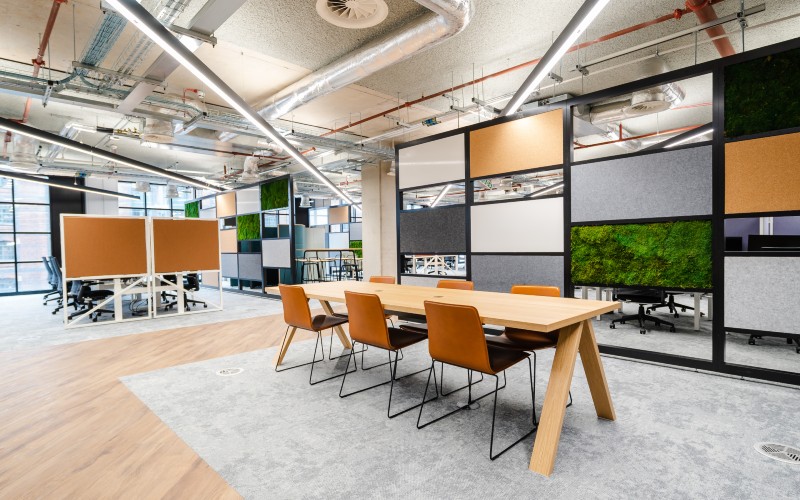
Fitout by OBI
“Over the last few years landlords have had to work incredibly hard to make sure that the products they’re delivering are going to make them attractive places for occupiers to want to go to work from,” he says.
“Landlords are sacrificing space that they would typically rent out and generate income from to provide breakout spaces, cafes, gyms and podcast studios etc. Those buildings with this diverse amenity offering and variety of workspace products are the ones that have performed during 2022.
“In 2023, we will see more of the same, with an increasing emergence of refurbished buildings which focus on their environmental and energy performance, aimed at scale-ups and SMEs with internal ESG targets they are looking to meet.”
OBI boss: Scaling tech firms now need sophisticated workspaces
Another fast-growing Manchester-based FinTech, AccessPay, has a flexible approach to working and sought to make its headquarters in City Tower exciting for staff to work from.
“We have quite a lot of music playing so it’s quite noisy: everyone in the office has access to the playlist so people can put what they want on. It’s a real mix,” says director of people & culture Sarah Chadbourne. “We have different speakers in different areas so you can control the volume.
“Each department gets to choose how they want to work. Some departments are coming in two days a week, other three and some are coming in one. Some departments are entirely remote.
“We have been led by the market. Our engineering and product teams are largely remote and our sales teams come in a couple of days a week. We find these days are quite concentrated. Like most companies, Mondays and Fridays are really quiet in our office.”
Chadbourne says the average age of staff is 25-35 and that influences their approach to working from home. “There are exceptions, but we’ve found the older workers normally want to work from home and the younger ones have been wanting to come in, especially when they’re new to the business.”
AccessPay has four mental health first aiders and new recruits have the choice of having a wellbeing allowance or membership of a PureGym.
‘Work from anywhere’
Manchester-based digital contracting software business Summize has just secured £5 million in Series A investment. The company uses AI to make legal contracts easier to understand.
Last month the company moved to larger offices in Portland Street, which includes collaboration spaces, a treehouse, a snug and spiral staircase. “We do have people in the office the majority of the time. It’s role specific,” says Laura Proctor, VP marketing (pictured, below, in yellow jacket).
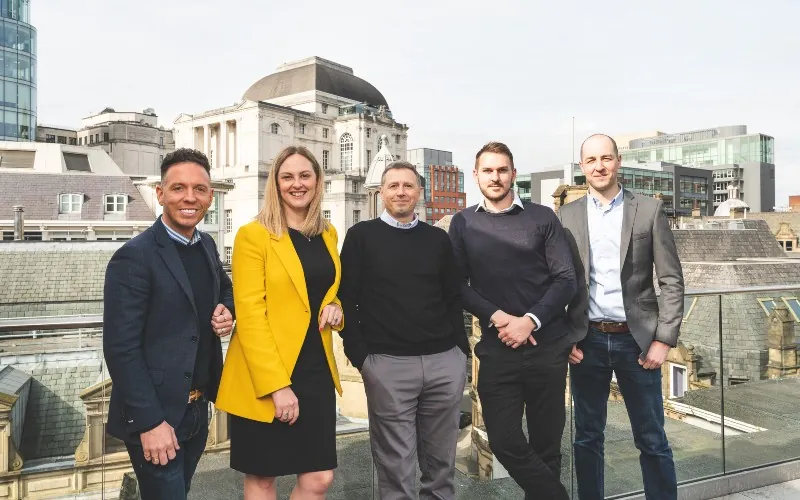
“We’ve found the development team are predominantly at home and the sales team are predominantly in the office. Everyone can have a minimum of one day at home a week.”
Summize introduces a ‘work from anywhere’ policy, enabling staff to work from a non-commutable area for up to four weeks. “Our head of marketing worked from Italy for a month. She did three weeks of work and then had a week’s holiday,” Proctor offers as an example.
Social spaces
Sparkbox has offices in Manchester and London and uses AI and in-depth data to help big brand merchandising teams make better stock buying and pricing decisions. The company raised £1.5m from Praetura Ventures earlier this year.
After working remotely during COVID, co-founder Lindsay Fisher says they had to decide how their teams work together in the future.
“What we landed on was two hubs, one in Manchester and one in London,” she explains. “What we’ve benefited from is having a team day a month. We make them fun and have a social element at the end.
“For example, we recently visited Google in London to have a look at their really cool offices. Google’s hub is full of very busy people who work on brightly coloured furniture and eat big plates of free food.
“A lot of staff want to be social. They want to leave their flat and hang out with someone new.”
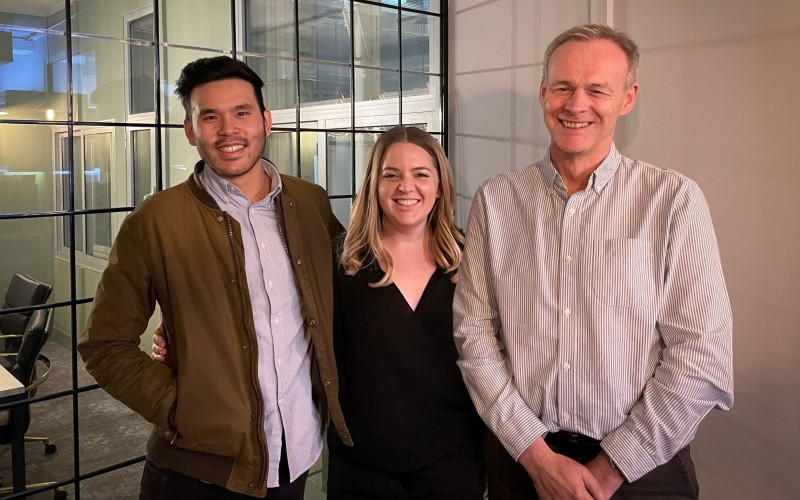
Sparkbox, which was formerly based in Southampton, has taken out co-working space membership to encourage this. “The team in London agree when they’re going to meet up,” says Fisher (pictured above, centre).
“My thing is I don’t care when people work. Their work will speak for itself, especially in a company of 12 people, although we expect that figure to rise.”
Book ahead
Fast-growing payments company Total Processing moved to Bruntwood Works’ 111 Piccadilly in March 2021 but has been a victim of its own success.
The company employs 50 people in Manchester but has found more people want to work in the office than desk spaces available so they introduced a booking app.
Director Cameron Lee says: “When COVID first happened and we came out of it, we took the space and thought we’d have lots of capacity. What we found was people wanted to work in the office and collaborate in-person.”
Verastar, which provides business services to the SME market, employs more than 1,000 staff across four main sites.
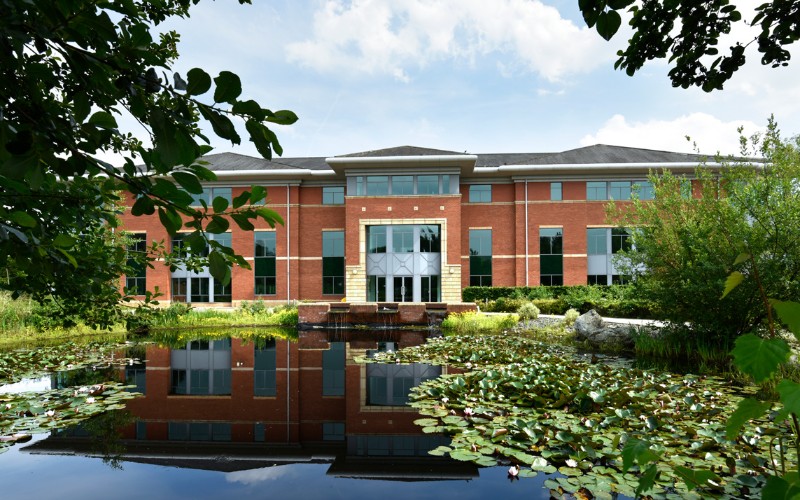
“We have hybrid working. Staff normally work three days in the office and two days at home. Happy colleagues make for happy customers,” says chief people officer Jo Dogherty.
Dogherty says its Sale HQ (above) is the base for 600 people – and the downside of hybrid working has been that the office is rarely full. “We have a big sales team and a big technology team. We need systems that can work across different products,” she adds.
Food, glorious food
Some companies have figured out that the way to a person’s heart is through their stomach.
“If you walk into the kitchen in our office, you’ll normally see an array of breakfast items,” says AccessPay’s Chadbourne. “Sometimes our office manager will make eggs in the microwave. Recently he made a full roast dinner for everyone using an air fryer and two microwaves – he’s a magician!”
Total Processing’s Lee adds: “We provide a bunch of snacks, ranging from fruit to Haribo. It helps people eat together more in the kitchen area.”
But the final word must go to Moneypenny, which has given new meaning to the idea of a working pub lunch. “We have subsidised lunches… and have a pub on-site!”

